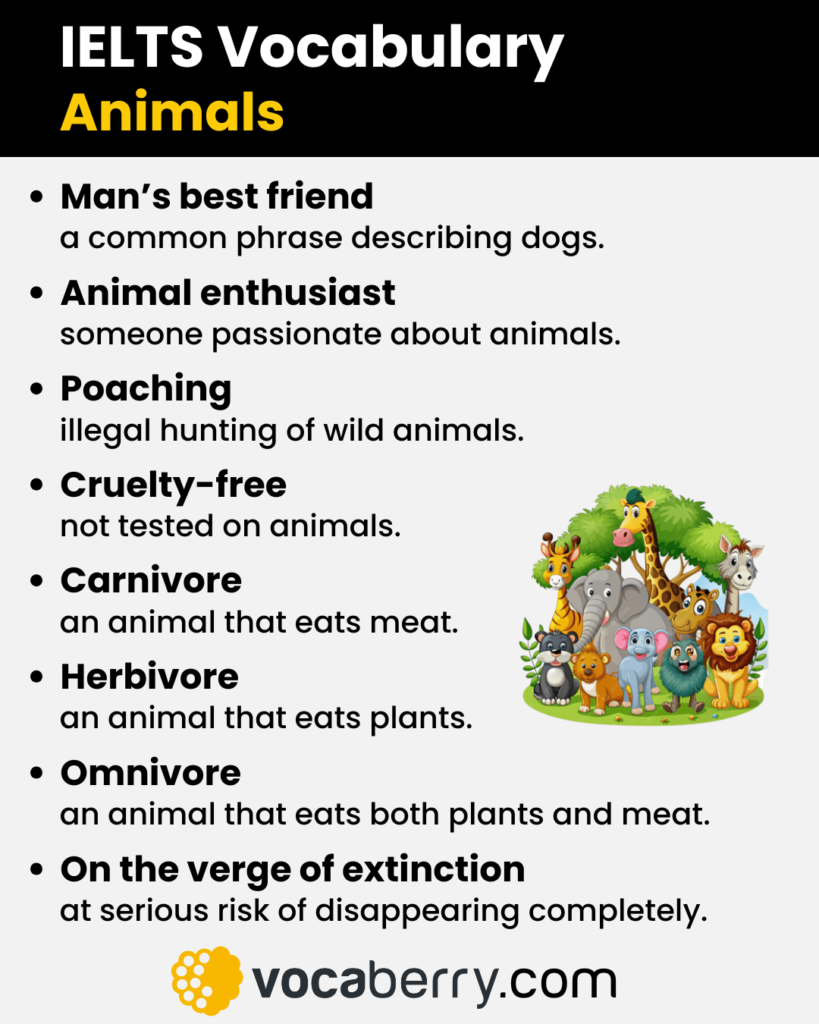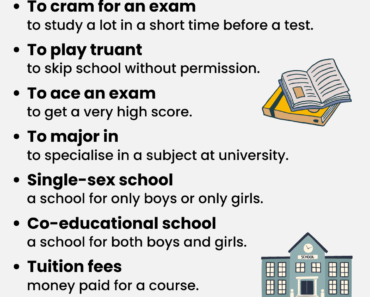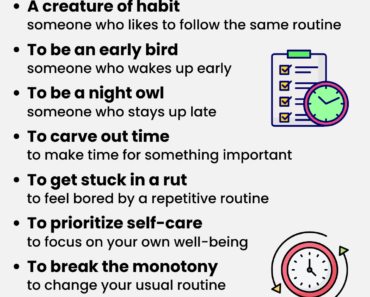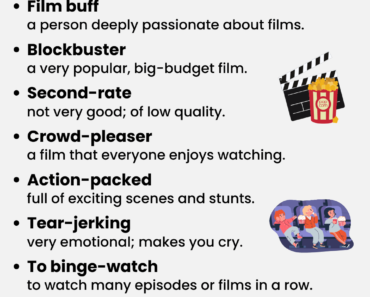
Animals are a common topic in the IELTS Speaking test. Examiners may ask you about your favorite animals, pets you’ve had, wild animals, or visits to zoos and nature parks. In this guide, you’ll learn useful IELTS vocabulary for animals with clear definitions, followed by IELTS Speaking Part 1, Part 2, and Part 3 questions with sample answers.
IELTS Vocabulary for Animals
Here is some useful IELTS vocabulary for talking about animals with clear definitions. These words and phrases will help you give better answers in the IELTS Speaking test.
- Wildlife – animals living in their natural environment.
- Domestic animal – an animal kept by humans, like dogs or cows.
- Endangered species – animals at risk of extinction.
- Extinct species – animals that no longer exist.
- Wildlife conservation – protecting wild animals and their habitats.
- Animal lover – someone who deeply cares about animals.
- Animal enthusiast – someone passionate about animals.
- Natural habitats – wild environments where animals live.
- Predator – an animal that hunts and eats other animals.
- Prey – an animal hunted and eaten by another animal.
- Stray – a homeless or lost animal.
- Carnivore – an animal that eats meat.
- Herbivore – an animal that eats plants.
- Omnivore – an animal that eats both plants and meat.
- Nocturnal – animals that are active mainly at night.
- Marine life – animals that live in the sea.
- Amphibian – an animal that lives both in water and on land.
- Animal shelter – a place where stray animals are cared for.
- Animal rights – the idea that animals deserve fair treatment.
- Animal cruelty – harming or mistreating animals.
- Cruelty-free – not tested on animals.
- Wildlife park – an area where animals roam freely in safety.
- Conservationist – someone who protects animals and nature.
- Poaching – illegal hunting of wild animals.
- Livestock – farm animals raised for food or work.
- Natural environment – surroundings where animals live.
- Ecosystem – a system of animals, plants, and environment.
- Biodiversity – the variety of life in one area.
- Predatory behavior – hunting actions typical of predators.
- Animal welfare – the well-being and humane treatment of animals.
- Human interference – human actions that affect animal life.
- Invasive species – animals harmful to non-native habitats.
- Captive breeding – raising animals in controlled environments.
- Wildlife sanctuary – a safe place where animals are protected.
- Habitat destruction – the loss of natural homes.
- Overhunting – hunting too many animals.
- Pollution – harmful substances in nature.
- Service animals – trained animals that assist people.
- Working animals – animals trained to do jobs.
- House-trained – an animal trained to behave properly indoors.
- Domesticated – adapted to living with humans over time.
- Emotional support animals – pets that help mental health.
- Instinctive behavior – natural actions animals are born with.
- Social animals – animals that live in groups.
- Solitary animals – animals that live alone.
- Territorial – protective of their living area.
- Hibernation – sleeping through winter for survival.
- Aquarium – a place where sea animals are displayed.
- Guinea pig – a small rodent often used in experiments.
- Cold-blooded – animals whose body heat changes with the environment.
- Ethical treatment of animals – fair and humane care for animals.
- Animal testing – using animals in scientific experiments.
- Fur trade – the buying and selling of animal fur for clothing.
- Free-range animal – an animal allowed to roam freely, not kept in cages.
- Species preservation – efforts to keep animal species from disappearing.
- Genetically modified animals – animals changed by science.
- Ahimsa – the principle of non-violence towards living beings.
- Welfare reforms – changes in law to improve animal care.
- On the verge of extinction – very close to disappearing completely.
- On the brink of extinction – at serious risk of becoming extinct.
- Man’s best friend – a common phrase describing dogs.
- To migrate – to move from one place to another seasonally.
- To hunt – to chase and kill animals for food or sport.
- To breed – to help animals reproduce.
- To tame – to train a wild animal to live with humans.
- To be put down – to humanely kill a sick or suffering animal.
- To go extinct – to disappear completely as a species.
- To protect wildlife – to take action to save wild animals.
- To be in danger of extinction – close to disappearing forever.
- To release into the wild – to free an animal in its natural area.
- To adapt to the environment – to change to survive in nature.
- To reintroduce a species – to return animals to their habitat.
- To rescue animals – to save animals from harm.
- To study animal behavior – to observe how animals act.
- To curb loneliness – to reduce feelings of being alone.
- To provide companionship – to offer company and emotional support.
- To treat animals humanely – to care for animals with kindness and respect.
- To keep something in captivity – to hold an animal in an enclosed space.
- To test the safety of new drugs – to try medicines on animals.
IELTS Speaking: Animals Questions & Answers
In this section, you’ll find IELTS Speaking Part 1, Part 2, and Part 3 questions on animals with sample answers. These examples show how the animal-related vocabulary can be used in your responses during the test.
IELTS Speaking Part 1 – Animals
Do you like animals?
Yes, I’ve always loved wildlife and domestic animals alike. Even as a child, I felt a strong empathy toward animals and dreamed of volunteering at an animal shelter to help stray dogs and cats. I believe that animal welfare is very important and that every creature deserves humane treatment.
Do you have any pets?
Yes, we have a house-trained, domesticated dog at home. She’s been part of the family for years, and she really helps curb loneliness. Having her around is wonderful for companionship. She’s truly man’s best friend.
Do you think people treat animals well in your country?
It depends. Some people are true animal lovers and support animal rights, while others still support harmful practices like the fur trade or neglecting stray animals. I think more public awareness and welfare reforms could really help improve animal welfare.
Are there any wild animals where you live?
Not many, but we occasionally see foxes or wild birds. Most of the wildlife has moved away due to habitat destruction and urban development. That’s why conservationists are pushing for more wildlife parks.
Do you think animals can be good for children?
Yes, especially if the child grows up around domesticated pets like rabbits or cats. It helps them learn how to treat animals humanely and respect living beings. I think these early experiences create more compassionate adults.
IELTS Speaking Part 2 – Animals Cue Card
Describe an animal you find interesting.
You should say:
- what the animal is
- where it lives
- what it looks like
- and explain why you find it interesting
Sample Answer:
One animal I find particularly interesting is the elephant. It’s one of the largest land mammals and is known not just for its size, but also for its intelligence and emotional depth. Elephants are found in parts of Africa and Asia, living in natural habitats like forests and grasslands. Sadly, due to habitat destruction and poaching, they’re now considered an endangered species in some regions.
What fascinates me most is how social they are. They live in family groups led by a matriarch and show signs of bonding, mourning, and even helping other species. This level of instinctive behaviour and empathy is rare and makes them truly unique.
Elephants are often featured in nature documentaries, and I remember one that showed their long-distance migration patterns. It was impressive how they travel across the ecosystem, guided by memory and communication. I also admire the work of wildlife conservationists and animal welfare groups that protect these animals from illegal fur trade and animal cruelty.
Unfortunately, many elephants have been taken from the wild and kept in captivity, either for tourism or labor. I believe more attention should be given to their ethical treatment and species preservation, as they’re vital for maintaining biodiversity in their regions.
Overall, elephants are more than just big animals. They’re intelligent, emotionally complex, and crucial to their environment. That’s why I find them so remarkable.
IELTS Speaking Part 3 – Animals Discussion
IELTS Speaking Part 3 questions about animals often ask you to talk about animal welfare, the importance of protecting wildlife, and how animals relate to human life. You might also be asked to share your views on zoos, pets, and endangered species.
Why do people keep animals as pets?
Many people choose to keep pets for companionship. For instance, having a domesticated, house-trained dog or cat can offer emotional comfort and help curb loneliness, especially for those living alone. In some cases, animals are even used as emotional support animals or service animals, which shows just how important they can be for mental and physical well-being. Pets often become part of the family, and caring for them teaches responsibility and empathy.
Do you think it’s right to keep animals in zoos?
That depends on the conditions. If a zoo is well-managed, focuses on animal welfare, and contributes to captive breeding or species preservation, it can play a valuable role in protecting endangered species. However, when animals are kept in small enclosures without proper care, it raises serious concerns about animal rights and ethical treatment of animals. I believe if animals are kept in captivity, it must be for a meaningful purpose, like education or conservation, not entertainment.
Why do some people care deeply about animal welfare?
Some individuals feel a strong emotional connection to animals and believe they should be treated with kindness and respect. Many people support cruelty-free products or reject practices like fur trade and animal testing because they’re concerned about the suffering animals endure. Others are involved in welfare reforms or follow principles like ahimsa, which promote non-violence toward all living beings. Ultimately, it’s about valuing life and recognising that animals can feel pain and emotions too.
How can we protect endangered species?
There are several ways to help. Supporting wildlife conservation efforts and protecting natural environments are essential first steps. Additionally, reintroducing species into the wild, stopping poaching, and limiting human interference in fragile ecosystems can make a big difference. Education also plays a role. By raising awareness, more people may be encouraged to act. Governments and NGOs should also enforce stronger laws around species preservation and ethical treatment to ensure long-term change.
More IELTS Vocabulary Topics
If you found this lesson useful, explore other IELTS Speaking topics to expand your vocabulary and practice with sample answers:
- IELTS Vocabulary: Accommodation
- IELTS Vocabulary: Advertisement
- IELTS Vocabulary: Art
- IELTS Vocabulary: Artificial Intelligence
- IELTS Vocabulary: Books
- IELTS Vocabulary: Childhood
- IELTS Vocabulary: Crime and Punishment
- IELTS Vocabulary: Culture and Traditions
- IELTS Vocabulary: Daily Routine
- IELTS Vocabulary: Education
- IELTS Vocabulary: Environment
- IELTS Vocabulary: Family
- IELTS Vocabulary: Fashion and Clothes
- IELTS Vocabulary: Films
- IELTS Vocabulary: Food & Diet
- IELTS Vocabulary: Friends
- IELTS Vocabulary: Gifts
- IELTS Vocabulary: Health
- IELTS Vocabulary: Hobbies
- IELTS Vocabulary: Hometown
- IELTS Vocabulary: Money
- IELTS Vocabulary: Museums
- IELTS Vocabulary: Music
- IELTS Vocabulary: Plants
- IELTS Vocabulary: Shopping
- IELTS Vocabulary: Social Media
- IELTS Vocabulary: Sports
- IELTS Vocabulary: Technology
- IELTS Vocabulary: Transport
- IELTS Vocabulary: Travel
- IELTS Vocabulary: Weather
- IELTS Vocabulary: Work & Jobs






